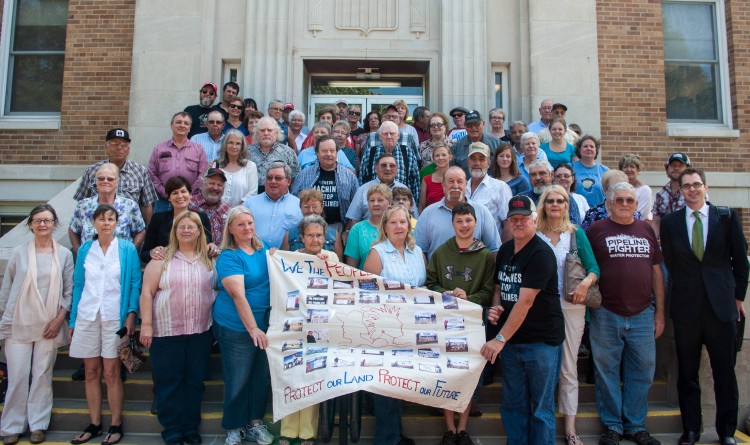 Plaintiffs fighting the Keystone XL pipeline pose for a photo July 27, 2015, outside the Holt County Courthouse. Photo by Mark Hefflinger Plaintiffs fighting the Keystone XL pipeline pose for a photo July 27, 2015, outside the Holt County Courthouse. Photo by Mark Hefflinger Holt County District Judge Mark Kozisek set an October 19 trial date for a lawsuit brought by a group of landowners faced with an eminent domain challenge by the Keystone XL Pipeline project on Monday at the Holt County Courthouse in O'Neill. The goal of the lawsuit is to keep TransCanada, the company building the pipeline, from seizing land to build the pipeline. This came after Kozisek granted the same landowners an injunction that halted land condemnation proceeding by TransCanada pending the outcome of the lawsuit. The $8 billion project would carry 830,000 barrels of crude oil daily from western Canada to refineries on the U.S. Gulf Coast. The Canadian company has sought U.S. federal approval for the international pipeline for almost seven years, and President Obama is expected to make the final decision at any time. Nebraska Governor Pete Ricketts sent President Obama a letter on Wednesday, urging him to approve the project: Earlier this year, the Nebraska Supreme Court cleared the way for approval of the Keystone XL pipeline's construction. Like many other Nebraskans, I support the revised route and the construction of the pipeline; however, you alone have the power to approve this important infrastructure project that will bring good-paying jobs and much-needed tax revenue to Nebraska counties during construction and for years to come. Read Governor Rickett's full letter here. Even if the pipeline is granted federal approval, construction may not commence until the legal dispute over eminent domain in Nebraska is settled. "Eminent domain" is a formal way to describe the legal authority to take a person's property without consent. According to Keystone XL, the use of eminent domain is a last resort, although it is "important and appropriate." They state: TransCanada’s goal is always to negotiate voluntary easement agreements with landowners by providing information about pipeline construction and seeking to develop an approach to minimize impacts of construction on their land. We can proudly say that we have acquired voluntary pipeline easements from 100 percent of the private landowners in Montana and South Dakota and 90 percent of landowners in Nebraska to-date. However, despite our best efforts to negotiate voluntary easements 100 percent of the time, that is not always the case. Our last resort when we cannot reach those agreements then becomes the process of eminent domain. Without an independent process like this, needed infrastructure such as pipelines would be difficult to build. Read more from Keystone XL on eminent domain here. BOLD Nebraska director Jane Kleeb issued a press statement following Rickett's letter release, saying, Before Gov. Ricketts sends letters to the President, he might want to sit down and visit with landowners and environmental groups who have valid concerns. He has not once sat with farmers and ranchers who were in court today protecting their property rights from eminent domain for private foreign gain. However, since Ricketts is paying for a former (or current?) TransCanada consultant as his private contractor and his Public Relations Director also worked on behalf of TransCanada, I see where he is getting his bad advice and incorrect information on the so-called jobs and economic activity. At the very least, we advise the Governor to not lie to the President. The route crossing the Aquifer was one of the main reasons people objected to the pipeline and even the Governor’s DEQ acknowledges the pipeline route still crosses this critical body of water. The landowners’ legal team, headed by attorney Dave Domina, plans to take the case to the Nebraska Supreme Court.
Amid the controversy, it is certain that all eyes will be on Nebraska on October 19. |



 RSS Feed
RSS Feed

